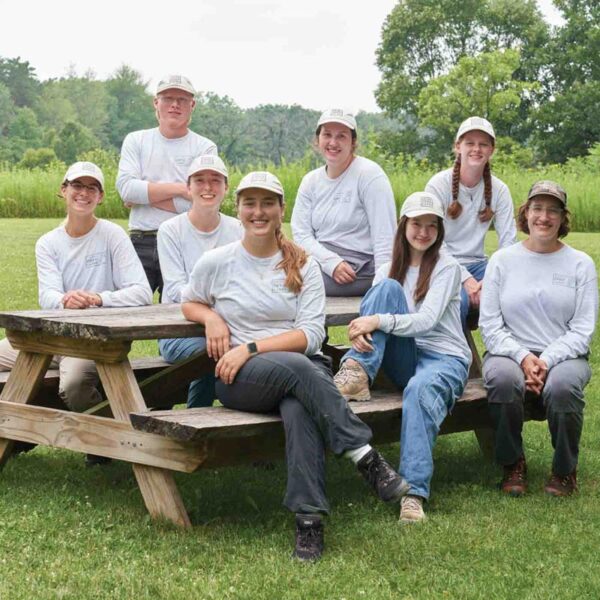BATS AND BEES
By Mitch Hurst
By Mitch Hurst

For more than 25 years, college interns have contributed to the important research work conducted by Lake Forest Open Lands Association (LFOLA), helping to preserve natural habitats on the North Shore and also providing important data for preservation efforts nationwide.
Over the years, 165 interns have participated in the association’s Restoration Ecology Summer Internship Program, and this summer seven interns monitored bat and rusty patched bumble bee habitats on association-managed land to provide baseline data on bat and bee populations.
The bat monitoring was conducted in collaboration with the North American Bat Monitoring Program while the bumblebee monitoring is part of a larger program coordinated by the United States Geological Survey. Both projects are meant to introduce the interns to different wildlife monitoring techniques and processes.
One of this year’s interns, Ellie DeMilt, is a Conservation and Restoration Ecology Major at Loyola University in Chicago. She says the LFOLA internship program provides broader opportunities to study and learn that she can’t get in a traditional academic setting.
“I was looking for a restoration ecology internship, and this one really pulled me in. There honestly aren’t that many in the Chicagoland area, especially one that’s exactly like the restoration ecology I’m studying in school right now,” DeMilt says. “The best part about this internship is that you get a lot of the hands-on technical skills that you can’t get in the classroom.”
In addition to conserving natural habitats, DeMilt says, restoration ecology is about returning prairies and wetlands or ecosystems back to their original condition before the humans moved in.
A senior at Notre Dame majoring in environmental science, Sarah Solozynski agrees with DeMilt that the chance to do field work and monitor the bat and bee populations on land managed by LFOLA greatly enhances what she’s learning in a lecture-style setting.
“Getting to actually witness these creatures out in the wild and getting to track their behavior has made me realize that I like being out in the field in that way,” Solozynski says. “So, for my career, I want to have options where I can be outside and don’t have to be inside 24/7. It’s definitely opened my eyes and also affirmed what I already knew about myself.”
DeMilt grew up going to YMCA summer camps which is where her interest in nature developed. She says the experiences create a respect for nature and a passion for sustainability. Her major was undecided when she first enrolled at Loyola until she learned the school had an Environmental Science Program.
“I got really lucky. It’s definitely something I have been interested in since I was a child with curiosities about nature,” says DeMilt. “I was always very excited about outdoor education programs, but getting to actually dive a lot deeper and then do some real work is really awesome.”
Solozynski grew up going to national parks and also grew up around dogs and birds, so being around animals and nature remain some of her best childhood memories. When she got older, she thought the only way she could apply that interest in school was to study biology.
“I started to take more classes and pay attention to the news, and I realized I wanted to apply myself in a different area,” she says. “So, I actually switched from a biology degree to environmental science.”
Molly Marz is in her second year as the internship coordinator at LFOLA and says the internship program is a critical component of the organization’s stewardship work. Having a crew that brings diverse majors and experiences to its research work helps the organization carry out its mission.
“One of the big reasons we have the internship program is to give students like Ellie and Sarah that first-time field work experience, which as they noted is hard to find,” says Susan Lenz, Senior Vice President of Community Conservation at LFOLA. “When you get out of school, it can be challenging to find a rewarding career path. This internship allows students to fully explore their interests in a field setting while also helping them create valuable connections in the conservation community.”
Both DeMilt and Skolozynski say their number one goal from the internship program as rising seniors is to get jobs after school, and they believe the internship opportunity will help them achieve that goal.
“We were able to work with herbicides and with machine tools and learn a lot about invasive species, a lot of things that I can use to market myself after college to get a job in this field,” Skolozynski says. “My other goal, which I think is one of the points of the internship, is to make connections. I’ve been able to make a lot of connections. There are multiple people that I can contact in the future for any questions about job opportunities in the field, which is really nice.”
Since its establishment in 1967, Lake Forest Open Lands has permanently preserved, restored, and maintained more than 900 acres of local native landscapes including prairies, savannas, woodlands, wetlands, and ravines for the benefit and enjoyment of the local communities. There are over 16 miles of walking trails that are open to the public year-round. Considered a leader among land trusts, Lake Forest Open Lands often serves as a resource to other emerging conservation groups in communities nationwide. In 2009, Lake Forest Open Lands became the first Illinois land trust to be accredited by the Land Trust Accreditation Commission, a mark of distinction in land conservation.
LFOLA is an independently funded conservation and educational organization devoted to the acquisition and stewardship of its natural landscapes, and to ensuring all generations have a meaningful, lasting connection to nature and to the land. They strive to engage and expand the community’s commitment to the preservation and conservation of the community’s historic and highly unique natural landscapes.
Sign Up for the JWC Media Email